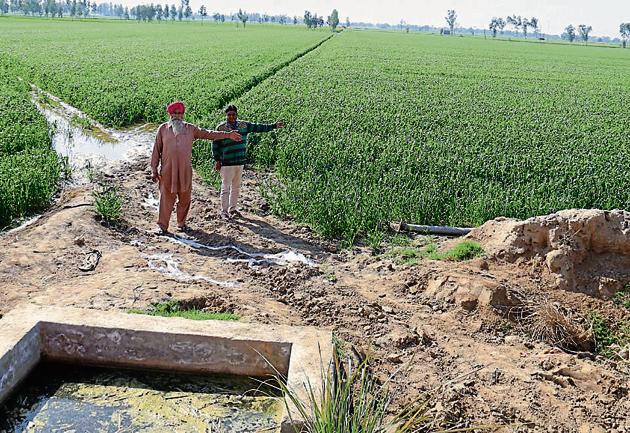War on waterlogging: Marshes turn farms again after years in 270 villages of Malwa
Six months after his brother committed suicide due to continuous crop failure for five years, Hardev Singh’s land has turned fertile this rabi season. The beleaguered family’s 12 acres had remained unproductive due to waterlogging for half a decade till ‘mission sem roko (halt waterlogging)’, came up as a succour for farmers like him at Kundli village of Fazilka district.
Six months after his brother committed suicide due to continuous crop failure for five years, Hardev Singh’s land has turned fertile this rabi season. The beleaguered family’s 12 acres had remained unproductive due to waterlogging for half a decade till ‘mission sem roko (halt waterlogging)’, came up as a succour for farmers like him at Kundli village of Fazilka district.

Mission ‘sem roko’ began in October 2015, with a target of pumping out the saline water from the 1.5-lakh acres across 270 villages in Fazilka and Muktsar districts.
The Rs 960 crore project undertaken by the Punjab irrigation department has so far achieved its target of rejuvenating 570 ponds, besides clearing the waterlogged areas where the saline water had also inundated many villages. The project was cleared by the Congress-led UPA-2 central government in 2014, agreeing to fund 75% of the total cost.
“We discovered that the ponds are the lifeline of these villages, and these choked water bodies were hindering the free flow of the underground water system in these areas,” said irrigation secretary KS Pannu, who had drafted the ‘sem roko’ project and got it sanctioned.
“We began the project in mid 2015, and it was a Herculean task with over two-dozen engineers surveying the vast tracts of land and supervising the laying of underground pipes and motors to pump out the saline water,” irrigation department’s superintending engineer (SE) Sohan Lal said has been distressing, including suicide by a farmer who did not see a single crop in five years.
“I am under Rs 8-lakh debt now that I owe to the banks and the money lenders,” said Hardev Singh, whose brother Jagseer Singh had ended his life.
Hardev is excited seeing the wheat crop after five years. “I hope I will be able to clear debt now,” he says, thanking XEN Manoj Bansal again and again for not allowing the ‘sem’ damaging the fields any more.
“Are motors doing fine?” Bansal asks a farmer at Rahurainwali village, where crops are swaying over 84 acres after 8 years.
TWO MOST DEVASTATED VILLAGES
Residents of Shajrana and Khui Khera villages in Fazilka have started relating themselves with farming after about three decades during which they could produce little on their land due to the waterlogging.
“Of the 635 acres of marshy land in Shajrana, 391 acres have been reclaimed. In Khui Khera, 458 of the 612 acres are good for farming now,” said XEN Pawan Kapur, who has been camping in the area for over a year now.
“I have tied my turban after several years,” said an emotionally charged Khajan Chand, who had a yield of paddy in October last year after 20 years. “Farmers have no self-respect if they do not have crops and the rising debt is so humiliating,” he said.
CENTRAL FUNDS AWAITED
The last UPA regime at the Centre had cleared the mission ‘sem roko’ project in January 2014, giving nod to 75% central grant for the Rs 960 crore project crore central grant was sanctioned in 2014, Punjab awaits the two instalments totalling Rs 280 crore,” Pannu told Hindustan Times.
“The next three years are equally crucial for the project to sustain, for which we need funds to pay the electricity bills for the motors to function and drain out the saline water at the highly vulnerable locations,” he said. The department also needed the much-awaited funds to clear wild grass through chemical de-weeding, he said.
He said funds are also need to construct a ditch drain to take the water to the adjoining Sutlej in the rainy season at Muhar Jamsher village in Fazilka district.
“The funds are expected by March 31,” he said.





